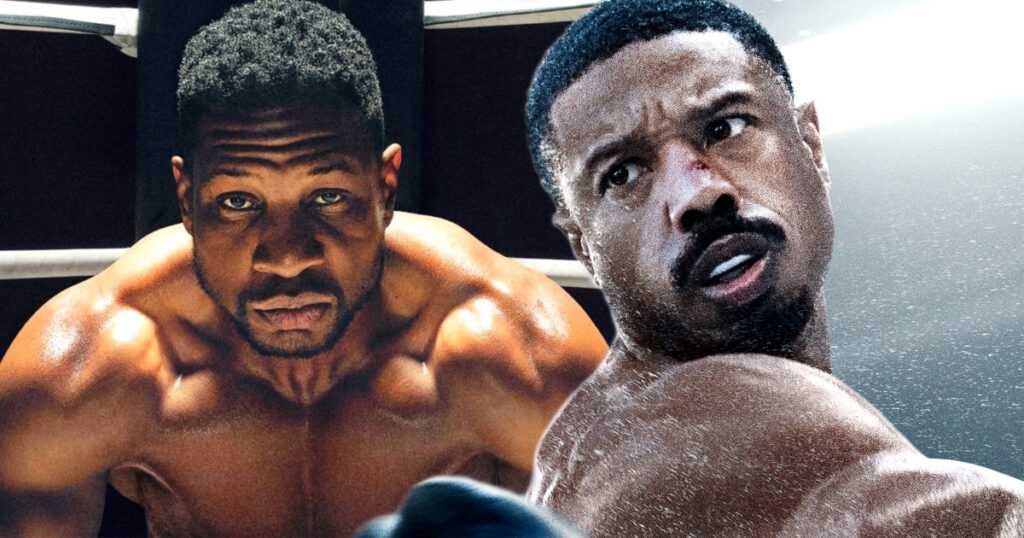
(For the audio version of this blog, please visit: http://brothersinchristcmf.org/wp-content/uploads/2023/03/Mass-Blog-Movie-Review-Creed-III-2023.mp3)
What do you think when you see the word “Creed?” If you go to the movies a lot, you may know it’s the latest in the series of boxing movies inspired by the original “Rocky” franchise. But if you frequent more Biblical sources, you might think of Creed as a set of closely-held beliefs—forgiveness chief among them.
The movie Creed is really about both fighting and faith. The movie opens with the young Adonis Creed and his friend Damian Anderson associating with the criminal element on their streets. These kids get into a fight with a rival and kill him, but the cops get to the scene in time to catch Damian while “Donnie” escapes. Donnie eventually moves on in his life to become Adonis Creed, a world champion boxer, while his friend rots in a prison cell for those many years.
During those years, Damian sends Donnie letters hoping to reconnect with his old friend, but Donnie’s mother intercepts them while he’s still living with her and hides them away—not wanting her son to associate with this troublemaker any more. Thanks to Creed’s not hearing from his friend, he eventually becomes deaf to him.
This is ironic, because when Creed starts a family of his own, his wife gives birth to a deaf baby girl. This forces Creed to learn sign language so he can communicate with her. Meanwhile, Damian finally gets out of jail and looks Donnie up to see if he can become a world class boxer like his friend—the one who never answered his letters. A subplot involving a private plan for revenge enters here.
Adonis takes his old “friend” under his wing and gradually turns him into the champion fighter he hoped to become. Once those skills are achieved, Damian turns them against Donnie. The deafness that stood between them all those years becomes bitter hatred—and then an eventual grudge match pitting the two against each other in the ring for a final reckoning.
By the end of this fight film, after the brutal beating they give each other results in one of them becoming world champion, Adonis soon discovers in his dying mother’s closet the stash of letters his friend Damian had sent him all those years. They reintroduce him to the friend to whom she made him deaf—the one he himself turned blind to. Adonis realizes their mutual bitterness and resentment wasn’t all his mother’s fault because he willingly missed the opportunity to visit his friend in prison to find out how he was doing all those years.
Forgiveness turns bitter enemies into friends once again. In the end, the movie “Creed” becomes a parable about A creed—one that promotes the importance of forgiveness. This message echoes an important truth from one of the Bible’s books of wisdom: Sirach—specifically Chapter 15, verses 16-17:
“Set before you are fire and water; to whatever you choose, stretch out your hand. Before everyone are life and death, whichever they choose will be given them.”
Unfortunately, while watching this film in a theater with my family, a group of young fans who were more inspired by the violence of Creed than the wisdom of a creed almost inspired a bonus fight at the movies. These kids were becoming restless during the more talky moments of the film. This led to frequent and loud conversations among them—disturbing fellow audience members trying to hear the movie. “Why don’t you brats go home and watch this on Netflix,” someone yelled.
Security broke-up this brewing altercation and the creed of peace was reinforced. But before this reviewer gets too self-righteous in preaching the creed of forgiveness while clicking his tongue at “kids these days,” the spirit moved me to revisit another book of Wisdom: the one in which a man named Job tries justifying himself before God. Job 29 schooled this writer with a bonus Biblical creed that fits the cinematic Creed like a boxing glove:
“I was eyes to the blind, and feet to the lame. I was a father to the poor; the complaint of the stranger I pursued, and I broke the jaws of the wicked man; from his teeth I forced the prey. … For me they listened and waited; they were silent for my counsel. Once I spoke, they said no more, but received my pronouncement drop by drop. … I decided their course and sat at their head, I lived like a king among the troops, like one who comforts mourners.”
I read the rest of the Book of Job and realized such self-justification is a Rocky road.
Creed is a winner in that way.
–Tom Andel